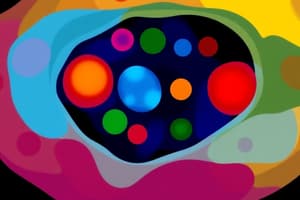Podcast
Questions and Answers
Which organelle acts like a powerhouse and supplies the cell with energy?
Which organelle acts like a powerhouse and supplies the cell with energy?
- Nucleus
- Chloroplast
- Cell membrane
- Mitochondria (correct)
Which organelle is responsible for absorbing light to be used in photosynthesis in plant cells?
Which organelle is responsible for absorbing light to be used in photosynthesis in plant cells?
- Chloroplast (correct)
- Nucleus
- Mitochondria
- Cell wall
Which type of organisms are made up of only one cell?
Which type of organisms are made up of only one cell?
- Amoeba (correct)
- Algae
- Fungi
- Mitochondrion
What is the function of the cell wall in plant cells?
What is the function of the cell wall in plant cells?
Which organelle is the control center of the cell and contains genetic information?
Which organelle is the control center of the cell and contains genetic information?
What is the function of brown fat cells in the body?
What is the function of brown fat cells in the body?
Which type of muscle cells is attached to vital organs and functions involuntarily?
Which type of muscle cells is attached to vital organs and functions involuntarily?
What is the function of white blood cells in the body?
What is the function of white blood cells in the body?
Which type of tissue forms surfaces over other organs, such as the skin?
Which type of tissue forms surfaces over other organs, such as the skin?
What do stem cells have the ability to do in terms of cell types?
What do stem cells have the ability to do in terms of cell types?
Flashcards are hidden until you start studying
Study Notes
Cell Organelles
- Organelles are small structures within cells that have specific jobs, similar to organs in the human body.
- The presence and absence of particular organelles allow us to classify cells.
Nucleus
- Control center of the cell
- Contains genetic information (DNA) which are instructions for the cell
- Found in both animal and plant cells
Cell Membrane
- Controls movements of substances into and out of a cell
- Holds the cell contents
- Found in both animal and plant cells
Cell Wall
- Supports, strengthens, and protects cells
- Not found in animal cells, only in plants, bacteria, and fungi
Mitochondria
- Supply the cell with energy using oxygen and food
- Involved in cellular respiration
- Mitochondrion (plural)
- More active cells have larger numbers (e.g., muscles)
- Found in both animal and plant cells
Chloroplast
- Absorb light from the sun to use in photosynthesis
- Contains a green pigment called chlorophyll which gives plants their color
- Only found in plant cells
Types of Organisms
- Unicellular organisms: made up of only one cell (e.g., bacteria, paramecium, amoeba, algae)
- Multicellular organisms: made up of many cells, specialized to do specific functions (e.g., fat cells, muscle cells, heart cells, nerve cells)
Muscle Cells
- Three types: skeletal, smooth, and cardiac
- Skeletal muscles: attached to bone, enable voluntary movement
- Smooth muscles: attached to vital organs, function involuntarily (e.g., digestive system)
- Cardiac muscles: regulate the heart
Nerve Cells
- Units of the nervous system
- Carry messages to the brain (for processing) and to cells to carry out a response
- Carry messages away from the brain to enable movement or response to environmental changes
Blood Cells
- Red blood cells: carry oxygen around the body, shaped like concave disks
- White blood cells: fight infection
Fat Cells
- Three key functions: store energy, insulate the body, and provide padding for vital organs
- Brown fat cells: produce heat for the body
- White fat cells: insulate the body and provide energy
Stem Cells
- Can turn into many different types of cells
Tissue
- A large mass of similar cells that make up part of an organism and perform a particular function
- Examples: epithelial tissue, connective tissue, muscle tissue, nervous tissue
Organ
- A collection of two or more types of tissue working together with a similar function
- Examples: respiratory, skeletal, nervous, reproductive, excretory systems
Studying That Suits You
Use AI to generate personalized quizzes and flashcards to suit your learning preferences.



